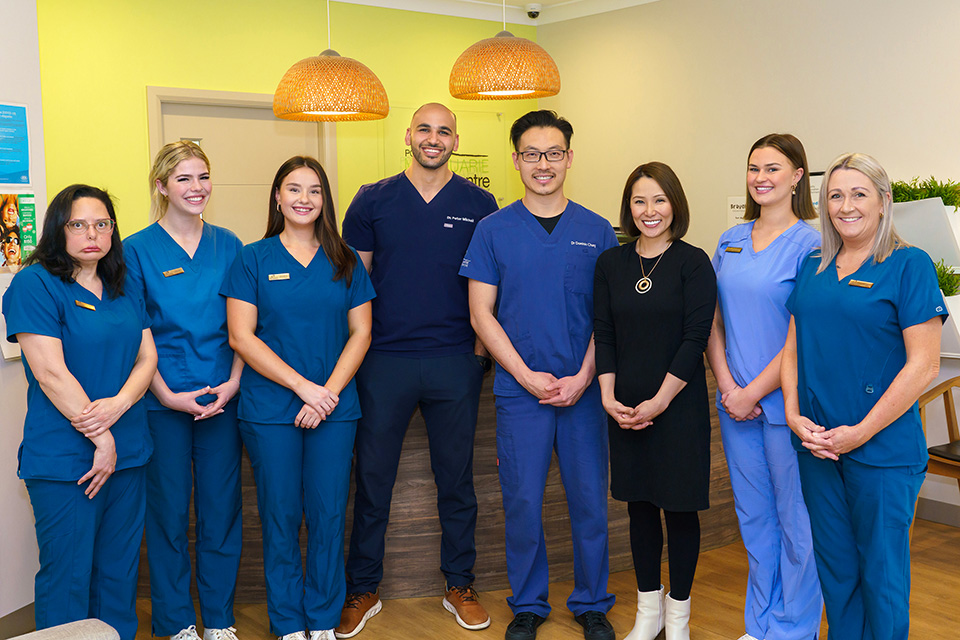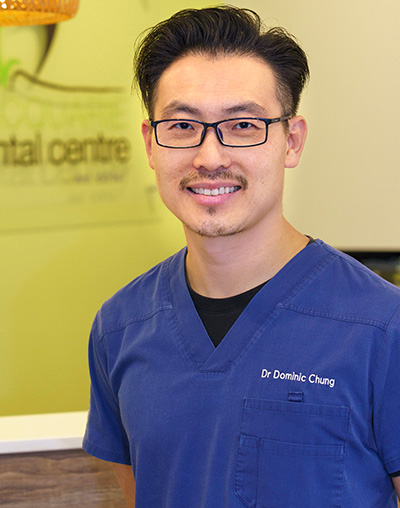About Us
General, Cosmetic, and Restorative Dentistry
Our Practice & Core Values
Port Macquarie Dental Centre is a small inviting practice conveniently located at 38 Buller Street in Port Macquarie.
We are close to the town centre, but far enough away to avoid hustle, bustle, or overcrowding.
We also offer onsite car parking for your convenience. Also, for your convenience, we offer weekday hours until 6 pm.
Our NEW surgery is entirely modern, relaxing, and comfortable, with floor to ceiling windows viewing the river and Westport Park. We have a Japanese Zen garden outside, and our furniture has been hand-picked for comfort.
Port Macquarie Dental Centre has created the most stress-free and relaxing experience possible!
Port Macquarie Dental Centre is the longest established dental clinic in the Port Macquarie area, having been at the same location over 50 years.
Our focus is on prevention of dental issues and creating a healthy mouth that supports dental and general health.
Port Macquarie Dental Centre is well equipped to manage your dental care.
Our modern practice is up-to-date with the latest dental techniques, procedures and equipment such as digital x-ray, intra-oral camera and In-chair bleaching.

Finding the right dentist is very important! Our emphasis is on preventative treatment and creating a healthy mouth.
We believe that a healthy mouth has a positive effect on the general wellbeing of any individual.
Our staff and dentists are well trained to give you the most gentle and caring dental experience possible.
We like to spend the time to explain to you your treatments. It is important for you to have the knowledge about your teeth and the treatment.
It is important for you to have the knowledge about your teeth and any treatment you may receive.
We believe a team effort between a dentist and the patient is vital to ensure a successful treatment – a treatment which will give you a great long term result!
Dr Dominic Chung BDS
(Principal Dentist)
Dr Dominic Chung graduated from the University of Otago, New Zealand in 2002 and worked as a private dentist for 2 years in a seaside town in New Zealand called New Plymouth.
He moved to Australia in 2004 and worked in Grafton for a further 4 years and a half. He and his family moved to the beautiful Port Macquarie in the early 2009 and took over Port Macquarie Dental Centre.
Dominic has almost 20 years of experience in comprehensive restorative and cosmetic dentistry. He also has special interests in oral surgery particularly in wisdom tooth extraction and implant dentistry. He regularly attends seminars to ensure he is updated with the most current dental skills and knowledge.
Latest Techniques
Innovative Technology
Payment Plans
At Port Macquarie Dental Centre, we provide interest-free dental payment plans for all your general, preventive, restorative, and cosmetic dental needs.
Port Macquarie Dental Centre Gallery


Dental Implants
Orthodontics
Teeth Whitening
Dental FAQ’s
Listed below are the most commonly asked questions we receive from our patients.
Why are my teeth so sensitive?
Teeth can be sensitive for many reasons, some include: cavities in teeth, cracked teeth and gum disease.
It is also very commonly caused by traumatic tooth brushing technique which can also cause gum recession and tooth abrasion.
It is important to accurately identify the exact cause so that suitable treatment can be done.
I have such a big cavity in my tooth but how come I haven't felt anything?
Most people have the misconception that a cavity will definitely give you pain and that it is fine to wait until there is a toothache before seeing a dentist.
Unfortunately, most of the time, a cavity produces no pain. However, when a tooth becomes very painful, then there is a good chance the nerve of the tooth has become irreversibly affected and would require more extensive treatment, such as root canal treatment or even extraction.
It is important to identify any early cavities at your check-up so that they can be controlled with minimal damage.
Why do my teeth bleed when I brush or floss?
Generally, it is the gums that bleed. The fragile gum tissues become inflamed when irritated by plaque accumulated around them.
Light contact on the irritated gums can easily cause them to bleed. This is a sign that you may have gingivitis and need to improve your brushing technique.
Using mouthwash alone without the correct brushing technique will NOT stop gingivitis.
Do I need to replace all my amalgam fillings?
Amalgam fillings have been widely used in the past and are still being used today in restoring teeth in areas with high biting force.
They are becoming the less popular choice of material due to the dark appearance and the concern over mercury poisoning.
However, there is no evidence to support that the mercury released from the amalgam restoration is significant enough to cause any health problem.
Why do dentists take X-rays?
Radiographs (widely known as X-rays) allow us to identify potential problems which we cannot see with our naked eyes (such as areas in between the teeth and under the gums).
It is a very important diagnostic tool used to correctly identify any problems.
Preventatively, bitewing radiographs should be taken at least once every 2 years (more frequently for individuals with high caries rate) to make sure there are no cavities forming in between the teeth and under the gums.
How often do I need to get my teeth checked and cleaned?
Routine cleaning removes plaque, stains and calculus. Once plaque calcifies to calculus, it can cause irritation and inflammation in your gums.
The build-up varies in each individual and some people may require more frequent cleaning than others.
Cleaning is usually done at your check-up.
A 6-monthly check-up, scale and clean is a good benchmark for most people.
When should I start bringing my children to the dentist?
Behavioural shaping at the dentist for young children is very important. We encourage parents to bring their children (as young as 2.5 – 3 years old) to come and watch while they are having a routine check-up or treatment done.
The children do not necessarily need any treatment or a check-up done at all. No one is a better role model than the parents.
Children will pick up the appropriate behaviour and be more confident when it is their turn to be in the chair in the future.
Why do we need dental crowns?
A crown is a custom-made cap that goes over a prepared tooth. It is very strong and helps to hold any extensively restored tooth together like a splint. This enables the tooth to withstand high biting forces in the mouth.
It is recommended for cracked teeth and those with large fillings which otherwise require frequent patching up.
A tooth which is frequently being patched up (with fillings), will eventually become non-restorable and can only be extracted.
Hence, crowns are the long term solution for all extensively restored teeth and for all cracked teeth (when the crack is still not too severe).
They are also widely used to improve the aesthetics of the front teeth.
I have been doing just fine with fillings for many years. Why can't I just have a filling instead of a crown this time?
Fillings work quite well when there is enough of the original tooth substance left to fix the filling on to.
In normal circumstances, a filling can last 5 – 15 years after which it either falls off or there are signs of dental caries starting to develop underneath or at the edge of the filling.
In many cases, your dentist can just change the filling to a new one. Each time a filling is changed, however, your dentist will need to remove a bit more of the original tooth in order to create a clean surface for the filling to be attached to.
This is the reason that your dentist might eventually deem the amount left of the original tooth insufficient for supporting a filling.
In this case, the only proper treatment alternative is a dental crown.
What is a root canal treatment?
A root canal can become infected and diseased due to decay, fracture (crack) or tooth injury.
The nerve inside the root canal subsequently dies and an abscess may start to form under the tooth.
Root canal treatment involves the removal of the necrotic nerve tissue and the cleaning, sterilisation and the sealing of the root canal to protect it. The end result of the root canal treatment is that we can keep the tooth.
However, a crown is always recommended following root canal treatment, as a root treated tooth tends to break and split more easily. This is frequently the case in the back teeth.

